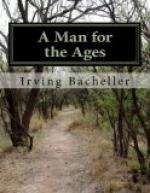“She told me that Eliphalet Biggs had been there. He had heard of the boy and wished to see him and demanded to know where he was. For fear that Biggs would try to get possession of ‘Mr. Nimble’ I took him with me to Springfield in the saddle.
“I learn that Davis has recovered his health and left the city. A man can not do business without friends and after the trial Chicago was no place for him.”
CHAPTER XXIII
WHICH PRESENTS THE PLEASANT COMEDY OF INDIVIDUALISM IN THE NEW CAPITAL, AND THE COURTSHIP OF LINCOLN AND MARY TODD.
Samson, with “Mr. Nimble” on a pad stuffed with straw in front of him, jogged across the prairies and waded the creeks and sloughs on his way to Springfield. The little lad was in his fourth year that summer. He slept and talked much on the way and kept Samson busy with queries about the sky and the creeks and the great flowery meadows. They camped the first night in a belt of timber and Samson writes that the boy “slept snug against me with his head on my arm. He went to sleep crying for his mother.” He adds:
* * * * *
“It reminded me of the old days of my young fatherhood. ‘Mr. Nimble’ wanted to pick all the the flowers and splash his bare feet in every stream. In the evening he would talk to the stars as if he were playing with them. To him the whole world is a plaything. He is like some of the grown folks in Chicago. He would sit hanging on to the reins and talk to the horse and to God by the hour. He used to tell me that God was a friend of his and I think he was right. It was good luck to get back to Sarah and the children. They took the little stranger into their hearts. ‘Heart room, house room’ is the motto of this part of the country.”
* * * * *
It was a new town to which Samson returned. The Governor and the state officers had moved to Springfield. The new Capitol was nearing completion. The hard times which had followed the downfall of ’37 had unjustly diminished Mr. Lincoln’s confidence in his ability as a legislator. He enjoyed the practice of the law which had begun to turn his interest from the affairs of state. But the pot of political science boiled before the fireplace in the rear of Joshua Speed’s store every evening that Lincoln and his associates were in Springfield. The wit and wisdom which bubbled into its vapors and the heat that surrounded it were the talk of the town. Many came to witness the process and presently it was moved, for a time, to more accommodating quarters. Before a crowd of people in the Presbyterian Church, Lincoln, Logan, Baker and Browning for the Whigs, and Douglas, Calhoun, Lamborn and Thomas for the Democrats, having assiduously prepared for the trial, debated the burning issues of the time. The effort of each filled an evening and Lincoln’s speech gave him new hope of himself. Wise men began to have




